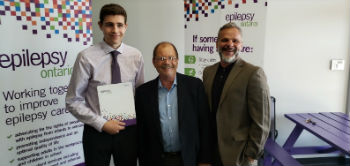By Deron Hamel
An old proverb states that necessity is the mother of invention.
Logan Place wants to someday develop a mobile application to track issues related to epilepsy to help doctors better manage the condition for patients – something he says would have been helpful to his doctors and family when he was being treated for seizures.

Logan, who is entering his first year as a student in the computer science program at Sheridan College, is driven by his own experiences living with epilepsy.
Diagnosed with epilepsy at age 6, Logan can attest to the trial and error that comes with trying to control a seizure disorder. After his diagnosis, Logan went through many tests to determine the cause of his seizures, and he was put on several medications to help manage his epilepsy.
But this process may have been easier for Logan, his parents and doctors if there had been a way for his family to better track daily occurrences related to his epilepsy, Logan says.
“When I look back on the years of trial and error through various medications and the difficulties keeping accurate records of what happened and when, it occurred to me that being able to record exactly what was happening and how I was feeling on a regular basis would be helpful for my family and the doctors,” Logan says.
Logan has been seizure-free for nearly three years. When Logan was 14, doctors discovered that the cause of his seizures was a brain lesion. After more than a year of further testing, doctors at SickKids in Toronto performed a successful operation on Logan to correct the issue.
But leading up to this was several years of his father tracking information related to Logan’s epilepsy by making notes that were supplied to doctors.
The app Logan hopes to develop would electronically track information, such as medications and their dosages, number of seizures, pain levels, and alertness and fatigue, and make it readily available for doctors to access.
“In my case, these recorded details would have made it much easier for the doctors to get complete and accurate information in a timely manner, rather than relying on my father’s scribbled notes at our next appointment that may be months away,” Logan says.
Logan is one of the recipients of this year’s Osler Epilepsy Scholarship. The $1,500 scholarship, formerly called the OBCL Epilepsy Scholarship, is being offered to six students this year.
Osler Epilepsy Scholarships are awarded each year to exceptional students who have confronted and overcome remarkable barriers in their academic and personal lives due to their epilepsy.
As part of this year’s application process, students submitted a 600- to 900-word essay focused on how they could see themselves helping an epilepsy association or another charitable organization in the future, based on their personal experiences.






